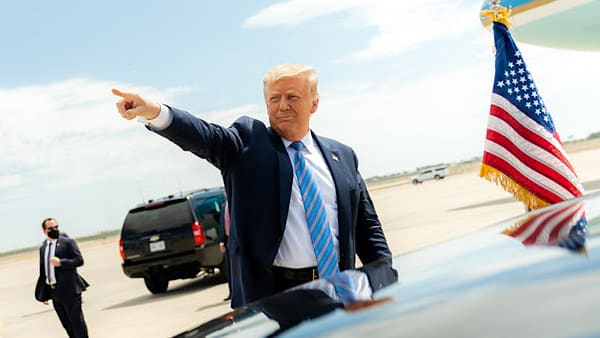President Donald J. Trump waves and gestures to the crowd upon his arrival to Midland International Air and Space Port in Midland, Texas, Wednesday, July 29, 2020. (Official White House photo by Shealah Craighead)
Six states have formally joined Texas in its Supreme Court lawsuit seeking to overturn the results of the 2020 election.
Texas Attorney General Ken Paxton said Thursday that Missouri, Arkansas, Louisiana, Mississippi, South Carolina and Utah have intervened as plaintiffs in its suit against the battleground states of Georgia, Michigan, Pennsylvania and Wisconsin.
All four of the defendant states have filed their replies to Texas, meeting the deadline set by Associate Justice Samuel Alito of 3 p.m. Thursday.
Texas alleges the four states “exploited” the coronavirus pandemic to “justify unlawfully enacting last-minute changes and ignoring both federal and state election laws, thus skewing the results of the 2020 General Election.”
TRENDING: Fox News loses key ratings battle to conservative competitor for first time ever
Missouri filed a friend-of-the-court brief Wednesday afternoon that was joined by Alabama, Arkansas, Florida, Indiana, Kansas, Louisiana, Mississippi, Montana, Nebraska, North Dakota, Oklahoma, South Carolina, South Dakota, Tennessee, Utah and West Virginia. The District of Columbia filed a friend-of-the-court brief on Thursday on behalf of the defendant states that was joined by 20 states and the territories of Guam and the Virgin Islands.
Paxton said in a statement Thursday that Texas “continues to lead the fight to protect election security and integrity, and today I gladly welcome Missouri, Arkansas, Louisiana, Mississippi, South Carolina and Utah to this historic endeavor.”
“By flouting state and federal election laws, the defendant battleground states have tainted the integrity of citizens’ votes across the entire nation,” he said.
Wisconsin Attorney General Josh Kaul contended in a tweet that the case has no merit.
Should states be suing to overturn the results of the 2020 election?
100% (45 Votes)
0% (0 Votes)
“I feel sorry for Texans that their tax dollars are being wasted on such a genuinely embarrassing lawsuit,” he wrote.
In a brief on behalf of President Trump requesting he join the case, constitutional scholar John Eastman argued it’s not necessary for the plaintiff “to prove that fraud occurred, however; it is only necessary to demonstrate that the elections in the defendant States materially deviated from the ‘manner’ of choosing electors established by their respective state Legislatures.
By failing to follow the rule of law, these officials put our nation’s belief in elected self-government at risk.”
Trump on Wednesday called it “the big one,” “the case that everyone has been waiting for.”
Pennsylvania Attorney General Josh Shapiro, in his state’s brief, charged Texas has “added its voice to the cacophony of bogus claims” about the 2020 election.
“Texas has not suffered harm simply because it dislikes the result of the election, and nothing in the text, history, or structure of the Constitution supports Texas’s view that it can dictate the manner in which four other states run their elections.”
Michigan’s brief, which argues that if the court fulfills’ Texas’ request, “it will upend the statutory process for the selection of presidential electors.”
“Moreover, it will disenfranchise millions of Michigan voters in favor of the preferences of a handful of people who appear to be disappointed with the official results.”
Eastman, a constitutional scholar at the Claremont Institute, said in a Fox News interview Tuesday that the “underlying issue there is a terrific one for the Supreme Court, because it doesn’t turn on proof of the allegations of fraud, the Dominion machines and all these other things that are huge evidentiary matters.”
Eastman said the case “turns on a very simple legal question: Did these states conduct an election in violation of their state law?”
He explained that Article II of the U.S. Constitution says the state legislatures have the sole authority to create the manner for choosing presidential electors.
On Tuesday, the U.S. Supreme Court rejected a request to block certification of Pennsylvania’s election results in a case filed by a Pennsylvania congressman challenging a 2019 law that expanded mail-in voting.
Rep. Mike Kelly, R-Pa., said Wednesday in a Newsmax TV interview his lawsuit is “still alive and well” and he plans to petition the court to hear the case based on its merits, which he admitted is “a huge ask.”
“But we are in the midst of a constitutional crisis right now in our country, and we have to get answers, and we have to get it from the highest court in the land,” he said.
His case contends Pennsylvania’s legislature violated the state constitution when it expanded the usage of mail-in ballots. Lawyers for Democratic Gov. Tom Wolf’s administration argued “no court has ever issued an order nullifying the governor’s certification of presidential election results.”




